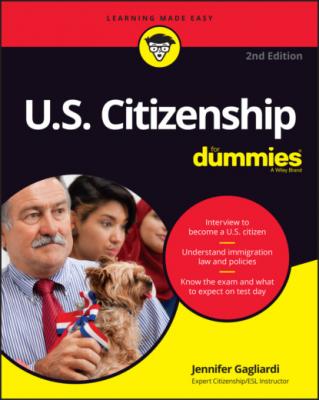ТОП просматриваемых книг сайта:
U.S. Citizenship For Dummies. Jennifer Gagliardi
Читать онлайн.Название U.S. Citizenship For Dummies
Год выпуска 0
isbn 9781119766896
Автор произведения Jennifer Gagliardi
Издательство John Wiley & Sons Limited
USCIS I am Married to a U.S. Citizen: www.uscis.gov/citizenship/learn-about-citizenship/citizenship-and-naturalization/i-am-married-to-a-us-citizen
Remove Conditions on My Status Based on Marriage: www.uscis.gov/forms/explore-my-options/remove-conditions-on-my-status-based-on-marriage
I-751, Petition to Remove Conditions on Residence: www.uscis.gov/I-751
Marrying a green-card holder
If you marry a lawful permanent resident of the United States, you aren’t considered an immediate relative. Instead, you fall under the family second preference category. If your spouse’s I-130 Petition for Alien Relative form is approved, the Department of State will notify you when a visa number becomes available.
Through a diversity immigrant visa (winning the visa lottery)
Through an employment-based immigrant visa
Based on a relationship to a U.S. citizen brother or sister
Based on a relationship to U.S. citizen parents after you were already married
If you’re a lawful permanent resident of the United States who marries a noncitizen spouse inside of the U.S., you can file Form I-130, Petition for Alien Relative. After a visa number becomes available, apply to adjust your spouse’s status to permanent residency using Form I-485.
Legally marrying a green-card holder OUTSIDE of the U.S.
Although no exact document exists in the United States, all civil-law countries require proof of legal capacity to enter into a marriage contract. This means that the lawful permanent resident of the United States must obtain certification by competent authority that no impediments to the marriage exist. Unless the foreign authorities will allow such a statement to be executed before one of their consular officials in the United States, the parties of a prospective marriage abroad must execute an affidavit at the U.S. embassy or consulate in the country where the marriage will occur. This affidavit of eligibility to marry states that both parties are free to marry. Some countries require witnesses to these affidavits. Check the law where you plan to marry.
A lawful permanent resident of the United States who married an noncitizen spouse outside of the U.S. can bring the noncitizen spouse to the United States by filing Form I-130, Petition for Alien Relative. When Form I-130 is approved and a visa is available, it will be sent for consular processing and the consulate or embassy will provide notification and processing information.
Marrying a U.S. Service member
Noncitizen spouses of U.S. service members may be eligible for expedited naturalization outside the United States. Generally, noncitizen spouses need to have lawful permanent resident status before naturalizing. To apply for adjustment of status, the noncitizen spouse must file Form I-485, Application to Register Permanent Residence or Adjust Status, and the U.S. citizen service member must file Form I-130, Petition for Alien Relative, including the biometrics fee. See USCIS Citizenship for Military Family Members at www.uscis.gov/military/citizenship-for-military-family-members.
MAKING THE BEST OF A BAD SITUATION: THE VIOLENCE AGAINST WOMEN ACT
In order for an alien to qualify for family-based immigration, a U.S. citizen or lawful permanent resident must file a I-130 Petition for Alien Relative form with the USCIS on the alien’s behalf. When, or even if, the petition is actually filed is strictly up to the relative petitioner.
Unfortunately, some people use their control of this process to abuse family members by threatening to report them to immigration authorities. As a result, most battered immigrants are afraid to report the abuse or their abusers.
Passed by Congress in 1994, the Violence Against Women Act (VAWA) allows the spouses and children of U.S. citizens or lawful permanent residents to self-petition for permanent legal immigration status. In order to protect the victims from their abusers, provisions of the VAWA allow certain battered immigrants (women or men) to file for immigration relief without their abusive relative’s assistance or even knowledge. Children of these self-petitioners also receive derivative benefits, meaning they can gain lawful permanent residence along with their parents.
Under VAWA, you may be eligible to become a lawful permanent resident (get a green card) if you are the victim of battery or extreme cruelty committed by any of the following:
A U.S. citizen spouse or former spouse
A U.S. citizen parent
A U.S. citizen son or daughter
A lawful permanent resident (LPR) spouse or former spouse
An LPR parent
You may self-petition under VAWA by filing a Petition for Amerasian, Widow(er), or Special Immigrant (Form I-360) without your abusive family member’s knowledge or consent. A person who files a VAWA self-petition is generally known as a VAWA self-petitioner. If your self-petition is approved and you meet other eligibility requirements, you may be eligible to apply to become a lawful permanent resident.
For further information, see USCIS Green Card for VAWA Self-Petitioner at www.uscis.gov/green-card/green-card-eligibility/green-card-for-vawa-self-petitioner.
Remember: If you are a victim of domestic violence, help is available to you through the National Domestic Violence Hotline. Call 800-799-SAFE (7233) or 800-787-3224 (TDD) for information about shelters, mental health care, legal advice, and other types of assistance, including information about self-petitioning for lawful permanent residence. You can also text “START” to 88788 or chat online at www.thehotline.org/get-help/.

